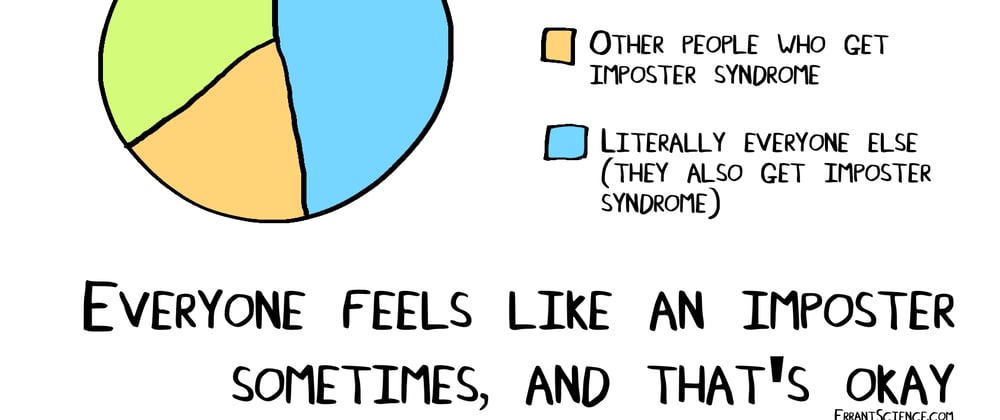Have you ever felt like you just aren’t smart enough or like you’re incapable of being a dev? How did you overcome this feeling? What did you learn from it? Please, share! 📢

For further actions, you may consider blocking this person and/or reporting abuse






Oldest comments (22)
I am chemical engineer passed out in 2005. Then, I joined government of India undertaking and appointed as head of credit for food and agro industries. After, nine years , I quiet that job to start my own venture .
Today , I own three companies- electronic, IT and infra. I love IT most.
I thought I won't be able to code ever. I started learning online from youtube etc .
Today, I know php fairly. My next learning is going to be python.
My business is also into cloud computing consultation. I learnt cloud.
I believe no one suffers from syndrome. The only thing is " every journey start with single step". Whenever, I think I can't do.... I take my first step. Even if don't reach the destination, I will atleast know the way of destination.
Of course. Most times that I get to do something I feel not prepared about.
What I learned from it is that it's pretty OK not to know everything and not being prepared about everything (which is impossible, also). You just need to allocate time to study and get better.
The key is to learn how to battle it and accept it as you grow.
Short answer is I haven't overcame it.
Everyone gets it whether they put a label on it or not. I guess from personal experience, I just acknowledge the fact that there's always someone better than me, therefore I need to keep an open mind and treat each moment as an opportunity to grow. This growth mindset is what's pushing me to pursue other hobbies outside of web development as well.
The advice I tell myself is to always compare what I am with what I was 3 months prior. This helps me quantify my progress.
So take it easy and pat yourself on the back for every small progress you make. Leaving this powerful message below:
1.01^365 = 37.8
0.99^365 = 0.03
Yes, that is something I have struggled with. There is no way to overcome it as it's a phase that will hit you once in a while. I can correlate the situation with this graph. All I can suggest(which worked for me), is to take it slow, chill for some time and let that mood subdue. All the best :)
I recently posted on this, my theory being that anybody who hasn't is either an idiot or doesn't see it as a bad thing, and that it's a good thing.
Impostor Syndrome
John Colagioia ・ Aug 23 '20 ・ 6 min read
Seriously, I'm glad people are finally willing to ask and those of us who have been at work for a longer time need to own up to it and normalize the fact that we're all in over our heads.
It's really the same life concept that: the more you learn, the more you realize you don't know much at all and I think that's one of the main things behind Impostor Syndrome.
That is Dunning-Kruger Effect for you.
The ones who are really knowledgeable about a subject realize that they still have a lot to learn.
Have you experienced any other form of motivation this effective in trying to prove yourself wrong?
Welcome to Game Theory :)
I feel like I struggle with this time to time when I am learning to code, but whenever I have learnt something I feel like I have accomplished something great. The feeling of creating something and for it to work has a great deal of satisfaction for me. I am trying my best for the imposter syndrome not to hit me again but lets see how I get along.
It's an ongoing process, but to list your skills and ask your co-workers about major points that could use improvements should provide honest feedback that really feels real, since any positive feedback will be met with constructive criticism, which in my experience, is enough to bypass the impostor's syndrome.
Lots of times. Past week was pretty bad, with a kind of bug solved today. Learned a lot in the process, but didn't feel like it should be something spending almost a week on.
I got some feedback from my Kafka Summit talk a few weeks ago which helped.
There is just so much you could learn as developer and there is ample time to learn. It doesn't feel totally right, but sometimes it helps to see other struggle. Like live demo's going wrong, or when helping out a colleague and noticing they make an error.
After some years in the field, here's my thinking:
The conclusion: everybody, at every level, even among the best of the best, will have this feeling that we shouldn't be here. That we shouldn't do what we do. That's normal, and when you fully realize that, you can begin to create some tactics to go around it:
It's difficult. You need to work on that as often as you can. When your mind wander into comparisons and judgment on yourself, remember the advice above.
When I got my CS degree, I cried everyday... Literally. My measure of success was how little I cried that day. But I got through it. Then overtime I realized coding is just HARD! Then I asked myself why IS this so hard??? I spent an ungodly amount of time trying to answer that question. What I learned was there are innate skills that coding broke down to, which are not intuitive at all, nor have any reflection on me as a human being. It was just another item on a long list of things that I needed to decide if I wanted to spend my time getting better at. Then I decided to build a company around these things so no one who have to feel like I felt ever again. Separate the skill from your worth as a person. You are smart enough, you are capable! It'll get easier. Good Luck!
I think ALL of us have dealt with it one way or another. I haven't overcome the feeling I learned to embrace it and use it as fuel to make me a better dev.
I think it is human nature to question ourselves at times.
It can healthy: moments of reflection and introspection, considering change, listening to our intuition, critiquing ourselves for improvement. What becomes unhealthy is when we get to a point where it is self-deprecating and debilitating.
In our professional lives and under the stress of expectation (self-inflicted or external), I find there is a fine line between constructive and destructive criticism and feedback and that line can only continue to blur and snowball under the circumstances. We generate the infamous feedback loop from hell and it can spiral down.
Take my advice with a grain of salt, but the following has helped me:
Again, this is empirical advice and we all come from different angles, but it may help you to find your own gotos!
Very frequently to be honest. When I started my job as a junior developer, I used to be afraid of getting exposed. I used ti think that someday everyone will figure out that I know nothing.
I've worked hard through the years and have gone through some promotions. Currently I'm the technical lead and have also published two gigantic articles on freeCodeCamp, but still I feel like that someday all my teammates will know that their lead is unworthy.
The worst part is I remain under pressure because of this feeling. I feel the urge to always be one step ahead and as a human, I can do just too much. Yesterday my CTO told me strictly to get a good sleep and stay off the grid this weekend.
I'm happy to have a team that takes care of me like family. I just wish to be happy with myself and not feel like an imposter.
Not really. In my case I’m not very good yet and I still have a lot to learn.